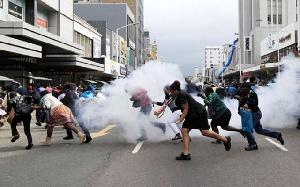 Xenophobic attacks in South Africa
Xenophobic attacks in South Africa
Ghana’s mission in South Africa has been “very proactive” in its attempt to protect Ghanaians from festering xenophobic attacks in that country, but the mission must also provide “safe havens” for Ghanaians there in the event that they are targeted, Ranking Member on the Foreign Affairs Committee of Parliament, Samuel Okudzeto Ablakwa has said.
“So far our mission in Pretoria has been very proactive, they have provided hotlines,” he commended when he spoke to Moro Awudu on Class91.3FM’s Executive Breakfast Show on Monday, 27 February.
“We have seen a good level of proactiveness and my checks in Pretoria indicate that the hotline is functioning,” he emphasised, but added that provision of shelters must be taken seriously.
Mr Ablakwa also said “some of us have called on the AU to take action. … We saw it in 2008, 2015 and now this one …it’s becoming one too many.”
The xenophobic attacks, led by black South Africans, is mainly targeting other black Africans especially Nigerians, who they accuse of taking their jobs and women.
Meanwhile, foreign nationals at the receiving end of the attacks have teamed up to fight against the black South Africans.
Speaking in an interview with Chief Jerry Forson, host of Ghana Yensom, on Accra100.5FM on Monday, 27 February, a Ghanaian in South Africa, Sarah, said: “Unlike in Ghana where the police will intervene to quell trouble in a community, South African police look on as a crime is being perpetrated. This is especially when the persons being attacked are foreigners. The only thing the police will do is to pick up their phones and take pictures and videos of the attacks.”
“We are very frightened, so most of us are locked up at home. It is only the men from different countries who have been courageous enough to team up and armed themselves with acids, knives, and pepper spray to launch reprisal attacks if the South Africans attack them because they feel helpless at this stage.”
Meanwhile, 18 Ghanaians have so far been rescued in the country from xenophobic attacks, according to Ghana’s mission there.
Five were first recused followed by another 13.
They have all been taken to Lynnwood, which is safer. So far, over 140 people have been arrested in Pretoria over the attacks.
The worst of such xenophobic attacks occurred in 2015.
Meanwhile, back home Minority Chief Whip Muntaka Mubarak is advocating a boycott of South African products to fight back.
“Can all Africans avoid any product from South Africa as a way of showing them that we depend on each other?” he quizzed.
“...Since the xenophobic attacks in 2015, I have not bought anything in South Africa apart from the food and water that I drink and I said it in the Pan Africa parliament because that was my protest as an individual to show that I’ll never go to their market to buy anything and I have stuck to that up to date. Mr Speaker, yes, we need to be diplomatic but the only way that a blind man can see that the eye of the sighted is really red is for him to give him/her a knock. …I think the time has come for African people to unite around this and at least not to also violently attack their properties in our country and not to violently attack their citizens in our country but to boycott their products.”
Reacting to the suggestion, Ghana’s Foreign Affairs Minister Shirley Botchwey told Class News that that should be the last resort by Ghana. She suggested the matter be left to ECOWAS and AU heads of state to resolve.
“That (boycott South African products) may be the last resort. It is important that when something like that happens and especially it’s not the first time it’s happening, it needs to be taken up to a higher level. So my suggestion will be that ECOWAS Ministers of Foreign Affairs take it up. Also, we take it up at the level of the heads of state and then extend it to the AU Heads of State,” the Anyaa Sowutuom legislator said.
“…We stood in solidarity with the people of South Africa when they were going through their difficult times of apartheid, so it is quite sad that today, through all the efforts that we all extended towards the abolition of apartheid, this should be happening to our nationals.”